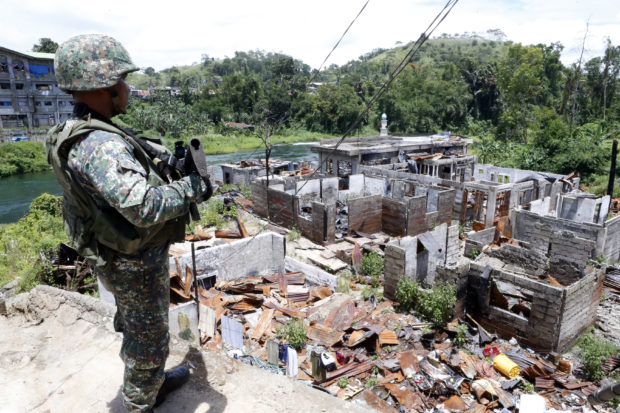
A Marine soldier is seen at the frontline in Marawi City in the southern Philippines Wednesday, September 27, 2017, as fighting between military and pro- ISIS militants continue. Photo by Jeoffrey Maitem
MARAWI CITY—Islamic State (IS) gunmen fleeing government forces had become easy targets for military snipers, which a ranking Army official said was the reason for an increase in the terrorists’ casualty figure.
Lt. Col. Romeo Brawner, deputy commander of Joint Task Force Ranao, said 711 IS gunmen had already been killed since homegrown IS affiliates Maute Group and Abu Sayyaf tried to set up an IS province here about four months ago.
Armed targets
The terrorists’ casualty figure was 680 just four days ago.
Brawner said in their haste to flee, the IS gunmen “cannot help but expose themselves to government sniper fire.”
“That’s the reason their fatality figure went up,” said the colonel.
The numbers, though, were not body counts but reports of military snipers hitting their targets. “They are visible from even afar,” said Brawner of the fleeing IS gunmen. “Our snipers saw them and they were armed, that’s why the only option remaining is for our snipers to neutralize them,” he said.
Brawner said as the end of the fighting drew near—“10-15 days more”—the area controlled by the terrorists had grown smaller.
“The siege will not last long,” said Brawner. “But our troops are trying their best to finish the siege earlier than that,” he said.
While there were still up to 60 hostages in the main battle zone, Brawner said the military was certain those killed by Army snipers were not civilians fleeing the fighting.
The terrorists, said Brawner, had split into smaller groups and divided the hostages.
The additional casualties among the terrorists left only up to 70 IS gunmen still alive, he said.
“Most of them are hiding inside foxholes so we cannot really see them all at the same time,” Brawner said.
Government casualty
The government, he said, had lost 152 soldiers and policemen, including those killed in so-called friendly fire.
He said the military was limited to using ground troops in its final assault on the terrorists because “we cannot bombard” areas where hostages were still being kept.
The assault, Brawner added, had been slowed down by booby traps set up by the terrorists. “The enemy has laid a lot of bombs,” he said.
Aside from laying siege to terrorist positions, soldiers had also been helping recover dead bodies in areas already cleared by the military, Brawner said. —JEOFFREY MAITEM AND RICHEL UMEL